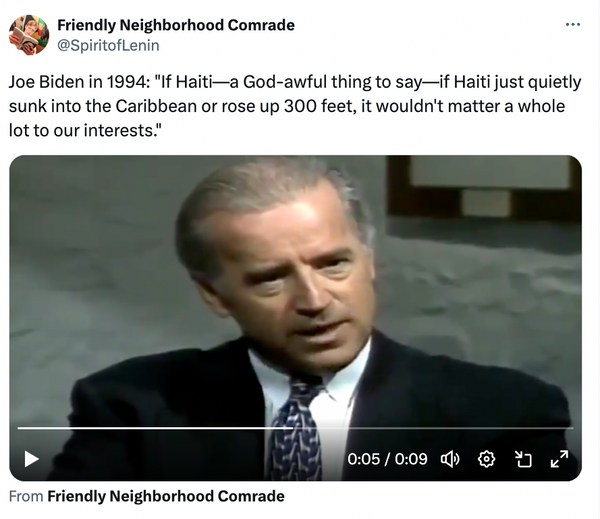In mid-September 2024, a resurfaced video clip featuring U.S. President Joe Biden sparked considerable debate on social media platforms. The clip, originating from a 1994 interview, features Biden making a controversial remark regarding Haiti, suggesting that if the country were to “sink into the Caribbean,” it wouldn’t significantly impact U.S. interests. This statement has led to discussions about the context in which it was made and the implications of such remarks in the current political landscape.
The video, which has garnered over 328,000 views, was shared widely, prompting a renewed examination of U.S. foreign policy priorities and the historical context surrounding Biden's comments. At the time of the interview, Biden was not only a U.S. Senator but also a key player in discussions regarding military interventions and international relations. His comments, intended to address the complexities of U.S. military involvement in foreign nations, have been interpreted in various ways, illustrating the delicate balance of international relations and public perception.
Moreover, the resurfacing of this clip raises questions about the accountability of public figures and the importance of context in political discourse. Biden’s assertion, while seemingly callous, was aimed at illustrating a broader point about global interests and military intervention. This moment not only reflects the complexities of foreign policy but also serves as a reminder of the scrutiny that public figures face when their words are taken out of context.
Background and Context of Biden's Statement
In the 1994 interview conducted by journalist Charlie Rose, Biden was discussing the potential for U.S. military intervention in Haiti amid concerns about political instability. He remarked, “If Haiti — a God-awful thing to say — if Haiti just quietly sunk into the Caribbean or rose up 300 feet, it wouldn’t matter a whole lot to our interests.” This statement was part of a larger conversation regarding the U.S. interests in various global conflicts, particularly in comparison to situations like Bosnia.
During this time, Haiti was experiencing significant turmoil following the overthrow of its first democratically elected president, Jean-Bertrand Aristide, in a military coup in 1991. The U.S. eventually intervened in 1994, deploying troops to restore Aristide to power. Biden's comments were reflective of the geopolitical calculus of the period, where U.S. interests in regions like Eastern Europe were often prioritized over those in the Caribbean.
The context behind Biden's statement is crucial for understanding its implications. He was not dismissing the value of Haitian lives but rather highlighting the complex nature of international relations and how decisions are often made based on national interests. This perspective invites a deeper examination of how foreign policy is shaped by economic and strategic considerations rather than purely humanitarian concerns.
Reactions and Interpretations
The resurfacing of Biden's remarks has led to a variety of reactions across the political spectrum. Critics argue that such statements reflect a long-standing pattern of neglect towards Haiti and similar nations, where U.S. foreign policy appears to prioritize strategic interests over humanitarian concerns. This perception can fuel discontent and mistrust among the populations of these nations, contributing to a cycle of instability and dependence.
Supporters of Biden, however, argue that his comments were taken out of context and misinterpreted. They contend that Biden was highlighting the difficult choices that policymakers often face when it comes to military intervention. The reality is that decisions about foreign intervention are complex and involve weighing numerous factors, including potential risks, costs, and benefits.
Ultimately, the discussion surrounding Biden's comments serves as a reminder of the importance of context in political discourse. It underscores the need for politicians to communicate more effectively, ensuring that their statements are not only clear but also understood within the appropriate context to avoid misinterpretation and backlash.

(Screenshot via X)
Key Takeaways from Biden's Remarks
- The importance of context in political statements and the potential for misinterpretation.
- The historical backdrop of U.S. foreign policy decisions regarding Haiti and similar nations.
- The complexities of weighing national interests against humanitarian concerns in foreign interventions.
- The need for clearer communication from public figures to avoid backlash over controversial statements.
Unraveling The Misleading Claims Surrounding Kamala Harris
Kamala Harris: A Gun Owner And Advocate For Stricter Gun Laws
Debunking Claims Of Haitian Goose Hunting In Springfield, Ohio


